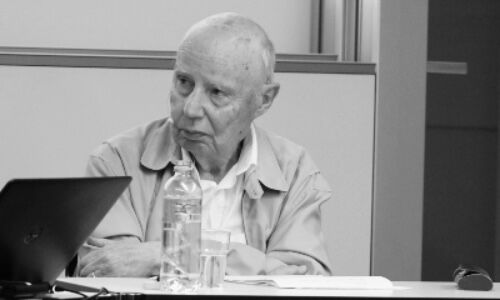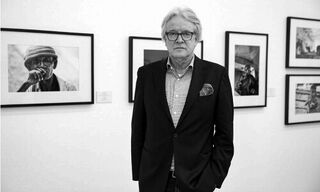Press «play» to listen to this content
1x
Playback Speed- 0.5
- 0.6
- 0.7
- 0.8
- 0.9
- 1
- 1.1
- 1.2
- 1.3
- 1.5
- 2
peter bernholz's insight and expertise will be missed. peter bernholz was many things: an outstanding economist, an expert in monetary theory and currency history, and a liberal, independent thinker. as a steadfast and consistent scholar, he tirelessly championed the fight against inflation and the cause of freedom in the public sphere. peter bernholz, emeritus professor of economics at the university of basel, passed away on saturday at the age of 95. his departure marks the end of a distinguished career of an economist who specialized in monetary theory and currency history while remaining open to the full spectrum of economic science. bernholz, who completed his habilitation at the university of frankfurt in 1962, was a brilliant and productive scholar, as evidenced by his extensive list of works and contributions. the number of conferences, colloquia, seminars, and meetings where he appeared before expert audiences likely numbers in the thousands. even when he wasn't on stage, he was known for his sharp-witted remarks at events, which often had the character of critical commentary. a treasure trove of knowledge on currency history. those who knew him personally were aware that he could also be subtle, inspiring, and pleasant in conversation, maintaining relationships over decades. his comprehensive knowledge of currency and ideas history was extraordinary, derived not only from books, research, and statistics but also from his personal experiences with various currency and governance regimes since the 1930s. not a professor in an ivory tower. aside from his extensive scientific work and teaching career—first as a lecturer and professor at the university of frankfurt and the technical university of berlin, and later from 1971 until his retirement in 1997 at the university of basel—bernholz consistently took the time to address controversial and relevant economic policy issues in public. he was particularly passionate about monetary policy and central banking, especially the proper management of inflation. he frequently warned of potential risks based on historical contexts. numerous contributions and interviews attest to his ability to argue with both expertise and clarity, making his points understandable and accessible outside of academic circles, a rarity in the german-speaking public discourse. political economy – politicians are self-interested. bernholz was a critical and liberal thinker and a pioneer in the field of political economy (public-choice theory), which analyzes politics through the lens of economics and reveals the self-interests of political actors. like many economists in this field, he valued democracy and the swiss model of direct democracy. his international network was extensive, partly due to his extended guest professorships at universities in the usa. he was also a member of the mont pèlerin society and the «verein für socialpolitik» and was awarded a medal by the hayek society in 2017. opposition to the swiss national bank's gold sales. his independence is evident in his willingness to steadfastly and consistently advocate for what he believed was right, even in the face of opposition. a notable example was his stance against the swiss national bank's politically driven gold sales (1300 tons, half of the reserves), decided in the late 1990s and implemented from 2000 onwards. at that time, bernholz was arguably the only internationally renowned economist in switzerland who dared to publicly oppose these sales. one of his main arguments was that the return on (interest-bearing) dollar investments was lower in real terms and in swiss francs over the long term compared to the return on (non-interest-bearing) gold; as a scholar, he not only argued this but also provided evidence with his own calculations. given the current record-breaking gold prices, this argument feels more relevant than ever. bernholz’s voice will be missed in debates on monetary policy, inflation, and central banks, as will his contributions to individual freedom and the fight against state overreach.
Peter Bernholz's Insight and Expertise Will Be Missed
Peter Bernholz was many things: an outstanding economist, an expert in monetary theory and currency history, and a liberal, independent thinker. As a steadfast and consistent scholar, he tirelessly championed the fight against inflation and the cause of freedom in the public sphere.
Peter Bernholz, emeritus professor of economics at the University of Basel, passed away on Saturday at the age of 95. His departure marks the end of a distinguished career of an economist who specialized in monetary theory and currency history while remaining open to the full spectrum of economic science.
Bernholz, who completed his habilitation at the University of Frankfurt in 1962, was a brilliant and productive scholar, as evidenced by his extensive list of works and contributions. The number of conferences, colloquia, seminars, and meetings where he appeared before expert audiences likely numbers in the thousands. Even when he wasn't on stage, he was known for his sharp-witted remarks at events, which often had the character of critical commentary.
A Treasure Trove of Knowledge on Currency History
Those who knew him personally were aware that he could also be subtle, inspiring, and pleasant in conversation, maintaining relationships over decades. His comprehensive knowledge of currency and ideas history was extraordinary, derived not only from books, research, and statistics but also from his personal experiences with various currency and governance regimes since the 1930s.
Not a Professor in an Ivory Tower
Aside from his extensive scientific work and teaching career—first as a lecturer and professor at the University of Frankfurt and the Technical University of Berlin, and later from 1971 until his retirement in 1997 at the University of Basel—Bernholz consistently took the time to address controversial and relevant economic policy issues in public.
He was particularly passionate about monetary policy and central banking, especially the proper management of inflation. He frequently warned of potential risks based on historical contexts. Numerous contributions and interviews attest to his ability to argue with both expertise and clarity, making his points understandable and accessible outside of academic circles, a rarity in the German-speaking public discourse.
Political Economy – Politicians Are Self-Interested
Bernholz was a critical and liberal thinker and a pioneer in the field of political economy (Public-Choice Theory), which analyzes politics through the lens of economics and reveals the self-interests of political actors. Like many economists in this field, he valued democracy and the Swiss model of direct democracy.
His international network was extensive, partly due to his extended guest professorships at universities in the USA. He was also a member of the Mont Pèlerin Society and the «Verein für Socialpolitik» and was awarded a medal by the Hayek Society in 2017.
Opposition to the Swiss National Bank's Gold Sales
His independence is evident in his willingness to steadfastly and consistently advocate for what he believed was right, even in the face of opposition. A notable example was his stance against the Swiss National Bank's politically driven gold sales (1300 tons, half of the reserves), decided in the late 1990s and implemented from 2000 onwards. At that time, Bernholz was arguably the only internationally renowned economist in Switzerland who dared to publicly oppose these sales.
One of his main arguments was that the return on (interest-bearing) dollar investments was lower in real terms and in Swiss francs over the long term compared to the return on (non-interest-bearing) gold; as a scholar, he not only argued this but also provided evidence with his own calculations. Given the current record-breaking gold prices, this argument feels more relevant than ever.
Bernholz’s voice will be missed in debates on monetary policy, inflation, and central banks, as will his contributions to individual freedom and the fight against state overreach.





















